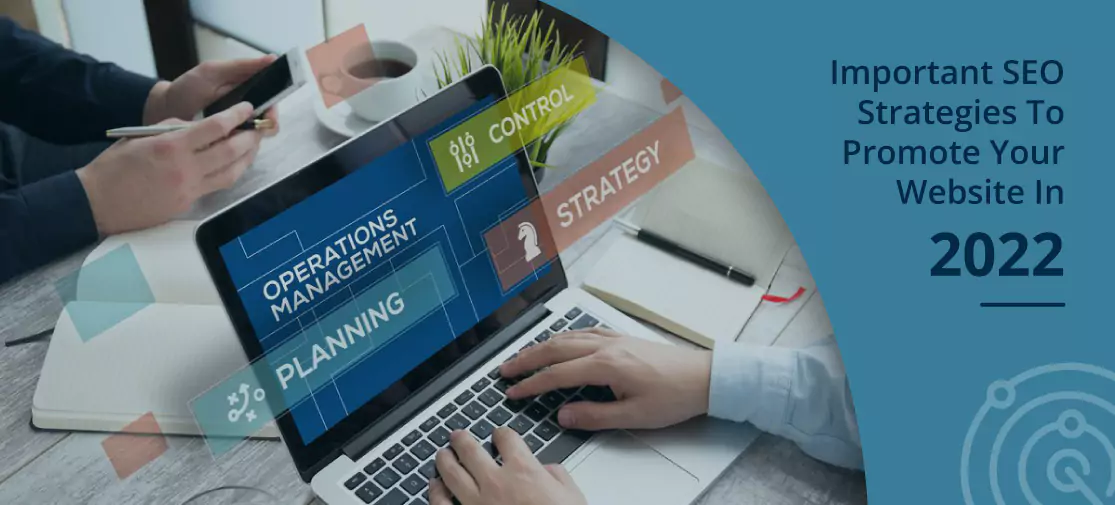In 2022, seo will become increasingly important
About 61% of marketers believe that SEO is the key to success online, according to Safari Digital. As a result, modern companies spend 41% of their budgets on it. Taking the time to develop an SEO strategy can revolutionize not just your website traffic, but your company as a whole.
With the way the world is right now, internet usage is the highest it's ever been. Since the pandemic has hit, we have done more online shopping, watched more movies and television than usual, and attended enough Zoom meetings to last a lifetime. SEO has been crucial for so many organizations in 2020, and we expect the same thing in 2021. As we approach the New Year, how can you design an SEO strategy that keeps up with the times? Let's start at the beginning.
The essential elements of every seo strategy
SEO is essentially the practice of utilizing a combination of qualitative content principles and technical improvements to improve your rankings on SERPs (search engine results pages). Quantity plays an important role, too. Writing more content, using more links, and using a wider variety of keywords is a great way to rank higher over time - this is called 'scaling' and it looks like it.
So, there are some things we have chucked out there. Before we get too far on our own, let's take a look at the key tools you'll use to get started building your 2022 SEO strategy.
1.Targeting keywords
Keywords are phrases that are commonly found on Google, Bing, etc. and are a crucial part of determining your website's ranking. Use the right number of keywords in the right places and over time you will see that your pages climb to the leaderboard.
The keyword strategy has changed a lot over the years, with only as much content as possible, but a lot of content later became spammy and the sites were eventually penalized by Google's algorithms. These days, you need to research your keywords, use a wide variety of keywords and fit them naturally. Google is getting smarter day by day, so they will make you work for it.
2. Meta data
You can think of metadata almost as your store window.. Your meta title and meta description are the first things a user sees in the SERP that influences whether they click or not.
Also, Google uses what are known as 'crawlers' (imagine a small robot spider) to scan through websites and collect information that matches the search query. By including keywords in your metadata (including image tags and heading tags), Google can quickly understand the relevance of your page.
3. Backlinks
As we move towards the more technical side of things, another crucial factor in SEO performance is gaining backlinks. This happens when another website links to you in an article or blog post. This not only helps you get what is known as a domain authority, but also directly improves the chances of people clicking on your website if it appears on other trusted domains.
You can only get organic links by writing compelling content: the better your work and the more closely you match the person's search objective, the more likely others in your industry to refer to your site. This holistic process is known as link-building and while you can easily reach other sites to trade links there are many activities that can help speed up the process:
- Guest blogging.
- Certificates
- Answer questions on sites
- Create a shareable content such as videos and infographics
- Use industry contacts and share on social (e.g., LinkedIn)
4. Technical SEO
Beyond that, there are various other technical issues at the back of your site that, once addressed, can make a big difference in your overall SEO results. At the end of the day, if the UX of your website is not simple and accessible, it will be difficult for any visitor to do anything significant on your website. For reference, more than 50% of all online traffic is mobile, so when it comes to things like UX, technical content is important.
Technical SEO tips like ensuring site speeds are fast, removing toxic backlinks (links to untrustworthy or irrelevant websites, etc.), and using an XML sitemap with a clean URL structure can be vital to achieving higher rankings. SEO should not be hindered from doing its job, which is allowing people to find your website organically.
5. SEO metrics
You can not do effective SEO if you don't know what "effective" means! To measure, analyze and refine your SEO strategy you need to have a thorough understanding of SEO metrics
What are the benefit of organic traffic in seo?
In terms of digital marketing, organic search strategies driven by SEO are unbeatable when it comes to longevity and cost-effectiveness. Not only is SEO cheaper than paid advertising, but its effects are also longer lasting. Unlike PPC campaigns that need to be renewed and bid costs fluctuate, SEO tracking tools compile lists of keywords from organic data and continue to provide content ideas as you dig deeper.
At first, SEO can seem like a slow burn. However, you can begin to see significant improvements in traffic and rankings after a few months. Moreover, the longer you stay with it, the more backlinks and site authority you build, which means you can target even bigger and better keywords and so on.
Starting at the other end of the spectrum-targeting long-tail keywords and more detailed variants-especially when it comes to content and specific sub-topics is another excellent way for SMBs to see results early and build a platform. About a third of Google's total search queries contain four or more words (i.e. long-tail keywords). Not only are these keywords less competitive, but they can also drive plenty of organic traffic because they are less competitive.
Pro 8 tips to build an effective seo strategy in 2022
There isn't always a need to go for the most popular search terms and expect to be able to compete with the big fish right off the bat. It's all about knowing your audience and providing content, information, and overall service that they want/need. As a result, here are eight SEO tips that are as effective in 2021 as they have always been.
To assist you with your strategy, you may also be interested in our epic website audit checklist (with a six-tab Google Sheet).
1. First, write for humans, then for search engines
Using constant human input, the Google algorithm continues to improve and align with our thinking as it gets smarter every day. You can't outwit a search engine with clever loopholes or magic formulas, so don't bother. Putting humans first and search engines second is the best way to write.
The most important thing is to provide your audience with what they are looking for, and that can only be achieved by writing engaging and fundamentally naturalistic content. Stuffing is even more blatant than shoehorned keywords, so fit them where it makes sense and let driving keywords elevate your content.
2. Place targeted keywords in all the right places
The motivation should always be humans first, followed by search engines, but keywords are what make this process work. SEO is not only better at understanding what visitors and Google want by isolating common search terms, but SEO also drives 1000%+ more traffic than organic social media, which already accounts for half of all online traffic. Therefore, if keywords are at the heart of SEO, they should also be at the heart of everything you do.
However, you can't just throw them in left, right, and center. so,first step is conduct to keyword research. In order to identify broad search intent and your "seed" keywords, use SEO tools like Google Ads, Ahrefs, and even simple on-site search bars. Dig deeper to find more long-tail variants, study your competitors to find keyword gaps, and don't forget to include them in your metadata and anchor text. Last but not least, avoid keyword stuffing. Ensure that they are naturally woven into your copy so they do not interfere with the readability.
3. Focus on user experience (UX)
There is nothing worse than navigating a site you can barely use. In fact, after more than a few seconds of frustration, most people don't get upset and Google will struggle to make the most of it. Things like dead links, error pages and cluttered site structures will affect what people remove from your website.
Not only do users value a good experience and easy navigation, but this integration also helps Google's crawlers scan your content and determine your SERP ranking. Use headings and short, easy-to-read paragraphs, organize your sub-folders and optimize for mobile. All of these things will help reduce your bounce rate, improve your rankings, and generate better conversions overall.
And now that Core Web Vitals has become a ranking factor through page experience updates, you should optimize page speed more than ever.
4. Link building should be focused on relevant content
A key component of building domain reputation/site authority is link-building. We've already discussed why outbound/external links are useful: you not only enhance the information you're providing, but you can receive reciprocal backlinks.
Links are also a key ranking factor. Crawlers and bots find content by following links through to subsequent pages and judging how relevant they are to a search query. The same applies to internal links, so don't be afraid to link to other useful pages on your site when appropriate and where it feels natural. Within one to three months of implementing a link-building strategy, 51% of marketers see an impact.
5. Featured snippets content format
Nowadays, featured snippets dominate SERPs. If you haven't heard of them before, you're probably familiar with them. The highlighted answer boxes appear at the top of the page for most search queries. When you earn a featured snippet, you're doing something right.
There are certain formatting and styling choices you can make to increase your chances of landing a featured snippet: bullet points, numbered lists, infographics, and directly answering questions. Although there is data that shows snippets don't always lead to direct clicks, since the search query is answered in the Google preview itself, over 19% of SERPs feature snippets. This is a great way to raise brand awareness and get your name out there. As a result, you'll still get clicks.
6. Remove whatever that slows down your website
You can't overstate how easy it is to get the technical stuff right so that your website and its content can speak for themselves. You need your website to be quick, accessible, and easy to use regardless of whether you're writing an informative blog, selling a product/service, or simply pointing someone in the right direction. Nowadays, people expect instant results and instant information. Your visitors will simply move on if your site takes a long time to load.
You can improve site speed and the overall smoothness of your UX by deleting old/defunct plugins, cleaning up your code, optimizing and compressing your images, making sure your subfolders flow and make sense, and using tools like Google Page Speed Insights and GTmetrix to monitor your site's speed over time.
7. Updates to the google algorithm should be paid attention
It has already been mentioned briefly, but Google gets smarter and more intuitive every day. Frequently, the algorithm is updated and tweaked, and sites either benefit or suffer depending on how closely they follow updates
Rankings and penalties are determined by a variety of factors, such as accessibility, speed, excessive advertising, or spammy content. Even though it can't always be avoided, you can take a few easy steps to stay in touch. To stay on top of recent or upcoming industry updates, subscribe to industry websites and forums. Check out Google's Search Console Community - and make sure to closely monitor your traffic with services like Google Analytics and SEMrush to see where updates have occurred.
8. Enhance existing content and add missing subtopics
The final thing to remember is that your SEO strategy doesn't end at the end of the day. With constant updates and competition between you and your competitors, there's always work to be done, not to mention that you can always improve. If you haven't used SEO properly, updating your content with keywords, backlinks, and better readability is a great way to get started. By regularly updating pages that have been performing well, you can ensure that they maintain traffic growth or build upon that success.
Regarding your keyword research, this is a great opportunity to use these phrases and competitor analysis to develop a long-term content strategy. To achieve more ideas of content, each keywords should carry a branch of plethora of others. Instead of writing, say, part of a specific topic, make it a 'water stone' article from which a number of other specific issues arise. Appropriate content can be audited using tools like SEMrush and Yoast; Adding and updating outdated content can double your traffic - just try to make it as green as possible and make sure to use the internal and external linking we talked about.




